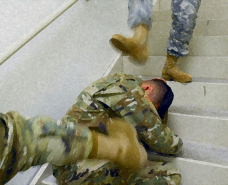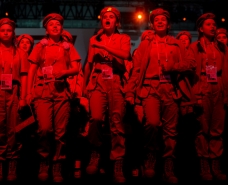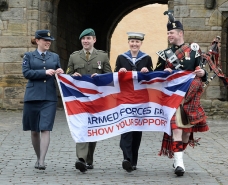War veterans call for rethink on recruitment of 16-year-olds

Former professionals condemn recruitment of teenagers by ‘pushing the notion of a noble military career to children’
A group of British war veterans will launch a campaign this week against enlisting 16-year-olds into the military.
Britain is the only state in Europe or Nato that still enlists minors, a policy criticised by the UN Committee on the Rights of the Child, the parliamentary joint committee on human rights and other groups including Child Soldiers International and British Quakers. The organisation Veterans For Peace (VFP) is demanding change, but the MoD says it depends on 16-year-olds for a quarter of the intake needed to sustain UK forces.
After a six-month trial, 16-year-olds are locked in to the forces until they reach 22, meaning a life-changing decision is made at a brutally young age, says VFP co-ordinator Ben Griffin, 37, who served in Northern Ireland, Iraq and Afghanistan in the SAS and the Parachute Regiment. He said his experiences gave him an “obligation” to tell teenagers the truth.
There is provision for “unhappy juniors” to be discharged at the discretion of their commanding officer but no guarantee it will happen.
“There’s no clear, uniformed enemy any more,” he said. “Basically,in war, you’re fighting a civilian population: you’re breaking down doors in the middle of the night. That can be a terrible shock. But by then you’re locked in. The clock doesn’t even start ticking on your four years until you’re 18. It’s a sinister thing, pulling in people who are less critical and easier to mould.”
VFP is releasing several darkly satirical short films ahead of Saturday’s Armed Forces Day to highlight the cost of war, featuring Action Man dolls with accessories including antidepressants, wheelchairs, “benefits cancelled” letters and body bags – inspired, said artist Darren Cullen and film-maker Price James, by official Armed Forces toys, which include a Predator drone playset for five-year-olds.
“Joining the military should be an informed decision,” said Cullen. “Armed Forces Day will be full of the glory of soldiering, the flag-waving and glamour, parachutists and the Red Arrows, all deliberately focused at children. We want to unpick the propaganda.”
David Cameron, who attended Eton’s Combined Cadet Force, has set a target of creating 100 new units in state schools to build “character, grit and determination”. Currently the majority of units are in private schools.
“We’re not a pacifist organisation but among the flag-waving on Armed Forces Day, spare a thought for the unquantifiable cost of war: not just those who have lost a limb, but those living with chronic pain, with facial or abdominal injuries, with PTSD, with anger and psychological damage, the effect on families,” said Griffin. “It’s OK to question these things. It’s not OK that people with a vested interested are pushing the notion of a noble military career to children.”
An MoD spokesman said: “We recruit across all age groups and as part of our duty of care to recruits no young person under the age of 18 may join our armed forces without the formal written consent of their parent or guardian.”
Recruitment of people under 18 makes a “significant contribution” to the forces’ annual intake, he said, without which it could not sustain personnel levels.
The MoD said that the armed forces do not recruit in schools and only attend by invitation in support of school activities.
An exhibition of the films and props will show at the Red Gallery, 1-3 Rivington Street, London EC2A 3DT from 23 June to 2 July. The films will be online from 23 June at veteransforpeace.org.uk
Source: The Guardian
Photo: VFP
Countering Military Recruitment

WRI's new booklet, Countering Military Recruitment: Learning the lessons of counter-recruitment campaigns internationally, is out now. The booklet includes examples of campaigning against youth militarisation across different countries with the contribution of grassroot activists.
You can order a paperback version here.








